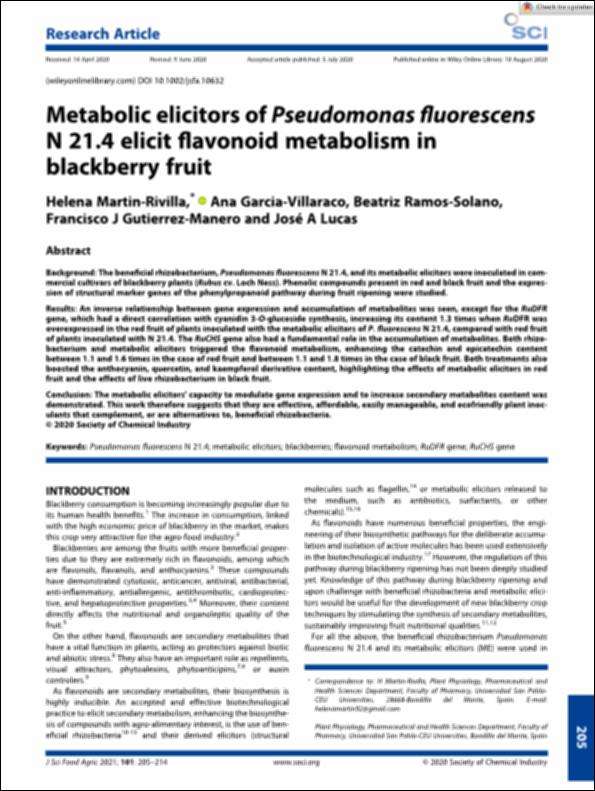Please use this identifier to cite or link to this item:
http://hdl.handle.net/10637/15902Metabolic elicitors of Pseudomonas fluorescens N 21.4 elicit flavonoid metabolism inblackberry fruit
| Title: | Metabolic elicitors of Pseudomonas fluorescens N 21.4 elicit flavonoid metabolism inblackberry fruit |
| Authors : | Martín Rivilla, Helena García Villaraco, Ana Ramos Solano, Beatriz Gutiérrez Mañero, Francisco Javier Lucas García, José Antonio |
| Keywords: | Pseudomonas fluorescens; Flavonoides |
| Publisher: | Wiley |
| Citation: | Martin-Rivilla H, Garcia-Villaraco A, Ramos-Solano B, Gutierrez-Manero FJ, Lucas JA. Metabolic elicitors of Pseudomonas fluorescens N 21.4 elicit flavonoid metabolism in blackberry fruit. J Sci Food Agric. 2021;101(1):205-214. doi:10.1002/jsfa.10632 |
| Abstract: | Background: The beneficial rhizobacterium, Pseudomonas fluorescens N 21.4, and its metabolic elicitors were inoculated in com-mercial cultivars of blackberry plants (Rubus cv. Loch Ness). Phenolic compounds present in red and black fruit and the expres-sion of structural marker genes of the phenylpropanoid pathway during fruit ripening were studied.Results: An inverse relationship between gene expression and accumulation of metabolites was seen, except for the RuDFRgene, which had a direct correlation with cyanidin 3-O-glucoside synthesis, increasing its content 1.3 times when RuDFR wasoverexpressed in the red fruit of plants inoculated with the metabolic elicitors of P. fluorescens N 21.4, compared with red fruitof plants inoculated with N 21.4. The RuCHS gene also had a fundamental role in the accumulation of metabolites. Both rhizo-bacterium and metabolic elicitors triggered the flavonoid metabolism, enhancing the catechin and epicatechin contentbetween 1.1 and 1.6 times in the case of red fruit and between 1.1 and 1.8 times in the case of black fruit. Both treatments alsoboosted the anthocyanin, quercetin, and kaempferol derivative content, highlighting the effects of metabolic elicitors in redfruit and the effects of live rhizobacterium in black fruit.Conclusion: The metabolic elicitors' capacity to modulate gene expression and to increase secondary metabolites content wasdemonstrated. This work therefore suggests that they are effective, affordable, easily manageable, and ecofriendly plant inoc-ulants that complement, or are alternatives to, beneficial rhizobacteria. |
| URI: | http://hdl.handle.net/10637/15902 |
| Rights : | http://creativecommons.org/licenses/by-nc-nd/4.0/deed.es Open Access |
| ISSN: | 1097-0010 |
| Issue Date: | 5-Jul-2020 |
| Center : | Universidad San Pablo-CEU |
| Appears in Collections: | Facultad de Farmacia |
Items in DSpace are protected by copyright, with all rights reserved, unless otherwise indicated.


